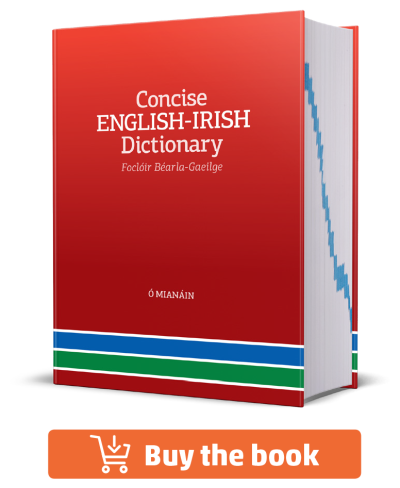Foclóir Gaeilge–Béarla
Ó Dónaill, 1977
An Foclóir Beag
Ó Dónaill & Ua Maoileoin, 1991
English–Irish Dictionary
de Bhaldraithe, 1959
Grammar
Pronunciation
beathnua
beathrach
beathú
beathúch
beathúil
beathuisce
beathúnas
beibe
beibheal
béic
béiceach
béiceadán
beiche
béicíl
béicthe
béideal
béideán
beidearán
beidh
béidh
Beidiúnach
beifear
been could be a grammatical form of:
be »
REVERSE SEARCH
IN FOCLÓIR GAEILGE—BÉARLA
PHRASES
IN FOCLÓIR GAEILGE—BÉARLA
Tá sé ar m’~ ó mhaidin, it has been on my mind all day.
Sin é a ~ riamh, that has always been his reputation.
Tá an t-airgead sin in ~ don chíos, that money has been set aside to pay the rent.
Tá na príosúnaigh ~, the prisoners have been released.
Tá an talamh sin ~ le trí bliana, that land has been in lea for three years.
Bhí ~ ar mo chroí i ndiaidh an reatha, my heart was beating fast after I had been running.
Tá a bheagán nó a mhórán déanta, a certain amount has been done.
Níor bheannaigh sé anseo le bliain, he has not been here for the past year.
2. Tá ~ sneachta caite aige, there has been a light fall of snow.
Níl ~ ná slacht ar an teach ó d’imigh sí, the house has not been properly kept since she left.
Tá mé ar mo bhoinn ó mhaidin, I have been on my feet all day.
Tá do rogha ar do bhos agat, you have been made an offer; you have your choice.
Tá sé ~te síos le fada, he has been bedridden a long time.
Cárbh fhearr duit fanacht anseo? Would it have been any better for you to stay here?
~eadh go leor leat, enough has been spent, wasted, on you.
~fidh (sé) go raibh deifir orthu, they must have been in a hurry.
Is iomaí ~ a rinneadh ar an scéal sin, that story has often been sifted, debated.
Tá sé ag ~ le fada, he has been ailing for a long time.
Tá an t-ordú curtha ar ~, the order has been cancelled.
Tá sé ~ ón lá a rugadh é, he has been peevish since the day he was born.
Tá sé ag ceiliúradh le fada, he has been failing for a long time.
Níl rud ar bith ~te fós, nothing has been determined yet.
Níor chis sé ar a chos leonta fós, he hasn’t been able to stand firmly on his sprained foot yet.
Tá an féar coscartha ag an aimsir, the hay has been broken up by the weather.
Tá an leabhar sin curtha amach go healaíonta, that book has been artistically produced.
Tá sí ag cur thairsti ó mhaidin, she has been letting off steam all day.
Tháinig sé gan chuireadh gan iarraidh, gan chuireadh gan chóiste, he came without having been invited.
Tá sé ar chúl a chinn le ráithe, he has been laid up for three months.
Bhí eolas acu ar dhála a sean, they knew how things had been with their forefathers.
De bharr a bhfuil ráite, on account of what has been said.
Tá siad i n~ a bheith ag imirt, they have just been playing.
Tá an bainne, an brachán, ~e, the harm is done, offence has been given.
Tá sé ar an ~ le fada, he has been on the booze, has been leading a wild life, this long time.
Táimid ag feitheamh leat le dhá uair ~, we have been expecting you for two whole hours.
3. Níl mé ~ na fáilte amuigh, I haven’t been away long enough to merit a welcome back.
~ an dorais i ndiaidh na foghla, locking the stable door after the horse has been stolen.
Ní hea ach fíoradh an chaint ó shin, no but the statement has since been proved true.
Ba dheas an ~ dom é, it would have been much to my benefit.
Tá tú ag éadromú le tamall, you have been losing weight recently.
Is fada ag ~eadh é, he has been ailing for a long time.
Is fada an lá ar an ~ sin é, he has been at that game for a long time.
Dá mba ~ a chaillfí iad, if they had (in fact) been lost.
An chéad ~ dó le mí, the first time he has been on his feet in a month.
Tar ~ gur crosadh air é, even though he had been forbidden to do it.
Tá mé ag ~eacht riamh leis, I have been hearing it all my life.
Tá mé ag ~eacht fada go leor libh, I have listened to, have been patient with, you long enough.
Tá ~ ar a shaol (nuair nár maraíodh é), he bears a charmed life (or he would have been killed).
Tá foighne fhada agam libh, I have been long patient with you.
Is ~ mé á rá sin leat, I have been saying that to you this long time.
Tá siad marbh le ~ riamh, they have been dead for a long long time.
